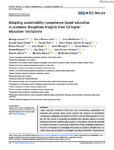Adopting sustainability competence-based education in academic disciplines: Insights from 13 higher education institutions

Use este enlace para citar
http://hdl.handle.net/2183/31725
Excepto si se señala otra cosa, la licencia del ítem se describe como Atribución-NoComercial-SinDerivadas 4.0 Internacional
Colecciones
- Investigación (FEE) [923]
Metadatos
Mostrar el registro completo del ítemTítulo
Adopting sustainability competence-based education in academic disciplines: Insights from 13 higher education institutionsAutor(es)
Fecha
2022Cita bibliográfica
How to cite this article: Lozano, R., Barreiro-Gen, M., Pietikäinen, J., Gago-Cortes, C., Favi, C., Jimenez Munguia, M. T., Monus, F., Sim~ao, J., Benayas, J., Desha, C., Bostanci, S., Djekic, I., Moneva, J. M., Sáenz, O., Awuzie, B., & Gladysz, B. (2022). Adopting sustainability competence-based education in academic disciplines: Insights from 13 higher education institutions. Sustainable Development, 30(4), 620–635. https:// doi.org/10.1002/sd.2253
Resumen
[Abstract]: Higher Education Institutions (HEIs) have been incorporating sustainability into
education and curricula, where recent research has focussed on sustainability
competences, pedagogical approaches, and how to connect them, generally on a single HEI. The process of integrating sustainability into education based on curricula
assessment has been explained using adoption of innovations; and has the potential
to explain the process of developing competences through pedagogical approaches.
The aim of this paper is to investigate this process at academic discipline level. An
online survey was developed to investigate teaching sustainability competences in 13 HEIs, from which 678 responses from educators were obtained. The competences
and pedagogical approaches from the responses were ranked, and then the connections between the competences and pedagogical approaches per discipline were
analysed using a correlations-based framework, from which three disciplines groups
were created. The groups were categorised using diffusion of innovations theory,
which indicated that some disciplines are more innovative than others in adopting
sustainability competence-based teaching. The results are used to propose two
frameworks to better understand the adoption of sustainability competence-based
teaching: (a) the D-RAPID framework; and (b) the Disciplinary Multi-dimensional Sustainability Influence Change for Academia (D-MuSICA) memework. The adoption of sustainability competence-base education must expand from a single HEI perspective to a
disciplinary collaborative one spanning many HEIs, where academic disciplines should
learn from each other's insights and mistakes and provide students with more transdisciplinary skillsets to make societies more sustainable.
Palabras clave
Academic disciplines
Competences
Education for sustainable development
Educators
Pedagogical approaches
Teaching
Competences
Education for sustainable development
Educators
Pedagogical approaches
Teaching
Versión del editor
Derechos
Atribución-NoComercial-SinDerivadas 4.0 Internacional
ISSN
0968-0802






